32nd week of pregnancy for mother and baby - 8th month of pregnancy
You have reached the thirty-second week of pregnancy and this means that the eighth month of your journey has already begun, which will lead you to the moment of birth (less and less!) And to the meeting with your baby. The growth of the fetus is proceeding at full speed also in this last trimester and surely you will have already had the opportunity to see it with the ultrasound. But what else is necessary to know for the expectant mother? Before continuing with the reading, here is a video with the things not to do in pregnancy.
Symptoms
We have collected the typical symptoms of the thirty-second week of pregnancy. Here they are below.
- food cravings
- frequent urge to pee due to the pressure made by the uterus on the bladder
- pain in the round ligament of the uterus
- insomnia
- shortness of breath and pain in the ribs
- joint pain in the thighs, hips and back
- constipation, bloating, indigestion and bloating
- contractions of Braxton Hicks
- nasal congestion
- burning throat
- cramps in the lower limbs
- varicose veins
- hemorrhoids
- strange dreams due to the increase in hormone levels
- pain in the coccyx
- itching around the belly, back and breasts
- hot flashes alternating with chills
- swollen and bleeding gums
- mood swings
See also
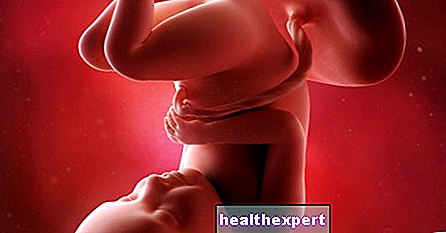


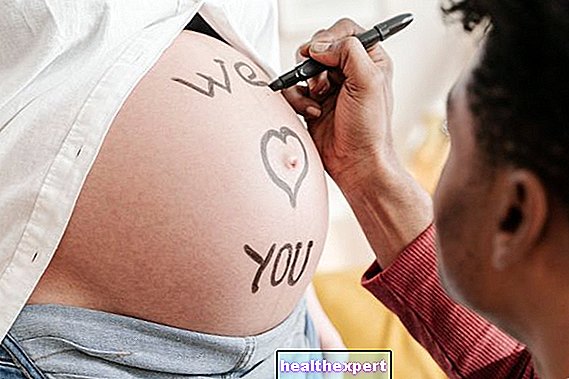
32nd week of pregnancy: changes in the woman's body
The belly of the expectant mother grows more and more adapting more to the development of the baby.
Some women in this period are afraid of giving birth prematurely, but consider that by the thirty-second week of pregnancy you are already very advanced, the baby is developed and its chances of survival are always higher. If in this period you happen to feel contractions, which become stronger and more numerous, and to have fluid or blood loss, you must immediately go to the hospital. You will be done all the tests to identify the cause of the leaks and the precise nature of the liquid. Being followed by a doctor allows you to monitor certain parameters such as the appearance of the cervix, to know exactly what stage you are in.
At the thirty-second week of pregnancy, the levels of the hormone relaxin increase, which relax your joints and muscles to prepare the body for childbirth. Sometimes pregnancy hormones can also affect the brain leading to sudden memory lapses.
The nipples in this period are more and more ready to breastfeed and therefore it is not uncommon to observe a thick and yellowish fluid (colostrum) leaking from the nipples.
Did you know that, at the time of delivery, you can decide to donate your umbilical cord blood? This blood, in fact, (like the placenta) is rich in stem cells that can be particularly useful for treating certain blood diseases, such as lymphomas or leukemias ... both in children and adults. Certain obstetric wards offer women who give birth to donate their umbilical cord blood anonymously and free of charge. This operation is absolutely painless and presents no risk for either the mother or the baby.
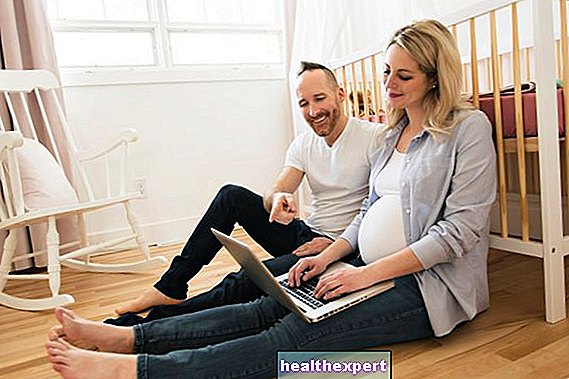
Have you already chosen the name for your baby? If you run out of ideas, get inspired by our list of names for all tastes!
The growth and development of the baby at the thirty-second week of pregnancy
The size of the fetus at the thirty-second week of pregnancy is similar to that of a potato: it is about 42 centimeters long and weighs 1.7 kilograms.
Its external appearance changes, thanks also to the formation of the layer of fat that grows under the skin, parallel to the hair that up to this point had covered his body and is now gradually disappearing. The hair begins to pigment and also become visible.
The fingernails have fully formed unlike the toenails which need more time to grow.
The lungs are still developing, but all the other major internal organs have finished growing, and are ready to function the day the baby is born.
The digestive system is also ready, even if at this moment the fetus continues to receive all the necessary nourishment directly from the umbilical cord.
Your baby in the 32nd week of pregnancy already has a well-formed skeleton, although it is still soft and flexible and is in the process of ossification.
In this phase, babies sleep for about 90% of the time, moreover if you don't feel them moving as before, it is also due to the fact that they now have much less space to be able to make big movements. Very frequent are the fetal hiccups that should not cause concern, as well as the position that the fetus assumes: the baby may already be upside down for birth, but it could also be breech or lying on its side. In all these cases, consider that he still has plenty of time to turn around.
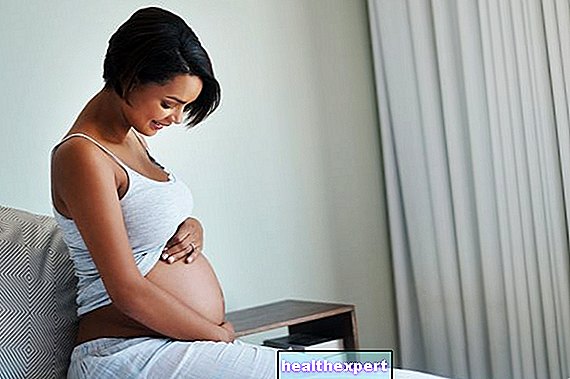
32 weeks of pregnancy: when to call the doctor
During the thirty-second week of pregnancy, there are some cases where it is best to get in touch with your doctor right away. Here's what they are.
- if the fetal movements are irregular or decreased compared to the past
- if the contractions become more regular and frequent
- if you notice vaginal bleeding, cramps similar to those that precede menstruation
- in case of discharge or loss of the mucous plug accompanied by symptoms such as diarrhea and vomiting or leakage of amniotic fluid
- sensation of strong pressure in the pelvic area (this could be a sign of premature birth)
- sudden weight gain
- changes in vision
- swelling of the face and hands
- constant headaches, nausea, dizziness
- extreme fatigue and pain in the upper abdomen (could indicate hypertension)
- pain or burning when urinating, abnormal and urgent urge to urinate, dark or cloudy urine accompanied by pain in the lower back and thick discharge (could indicate urinary tract infections or candidiasis)
- excessive thirst and dry mouth together with fatigue, dizziness, sudden visual changes, yellowish or dark urine, and an urgent urge to urinate despite little or no urine (could indicate gestational diabetes)

Our advice
What surname should you give to your child?
Since January 2007, also in Italy it is possible to choose the surname to give to the children: it can be that of the mother, that of the father, or both surnames, in the order decided by mutual agreement.
In fact, that of giving the paternal surname is only a practice that has been consolidated in the tradition of the Italian registry office. The "uses" provide that when the child is born to a legitimately married couple, he takes on the father's surname, that is, that of the mother's husband.
But with decree law 19, approved by the Senate Justice Commission on January 17, 2007, significant changes to the civil code regarding the children's surname were ratified. Parents can choose, at the time of registration, to give the child any surname as long as they agree.
If there is no consent from one of the two, the registrar assigns the surnames of both parents to the child in alphabetical order. Subsequent children, generated by the same parents, will be automatically assigned the same surname attributed to the first child. Finally, the child to whom the surname of both parents is attributed will transmit to his child only one of the two surnames, of his choice.
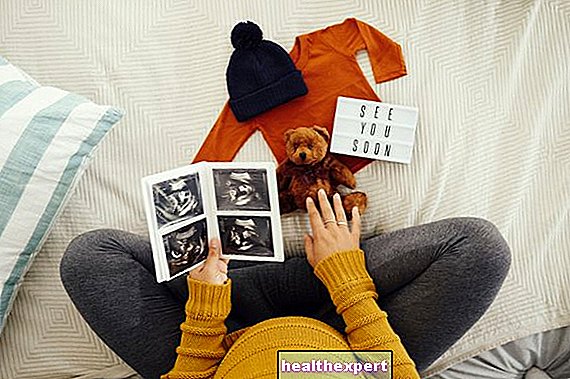
Children born to a cohabiting couple
As for natural children, i.e. children procreated by parents not united by marriage, however, there is a specific regulation of the Code. In fact, Article 262 of the Civil Code provides for the following discipline:
“The natural child takes the surname of the parent who first recognized him. If the recognition was carried out simultaneously by both parents, the natural child takes the father's surname while if the filiation towards the father has been ascertained or recognized after recognition by the mother, the natural child can take the father's surname by adding it or replacing it with that of the mother. And in the case of minors it is the judge who decides on the assumption of the father's surname.”
Good to know
With this legislation, Italy has finally accepted the recommendations of the Council of Europe for full equality between mother and father in the attribution of surnames to children, aligning its legislation with that of other Member States, such as Spain, Portugal, Germany , Great Britain and France.
Before this decree there was, in reality, no specific law for the attribution of the surname (there were indications only for children born out of wedlock) but a patriarchal tradition had taken root which has resisted numerous attempts to modification and updating. The maternal surname could only be added if it was proved necessary (interests to be protected or a commercial reason).
See also: The problems of pregnancy: daily difficulties of a pregnant woman according to Line Severinsen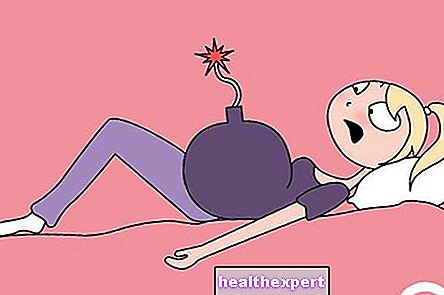
This "tradition" was now clearly opposed to the reality of female emancipation and openly in conflict with the constitutional principle of "equality between men and women: nevertheless, years had to pass before a new law came to replace the rules in force, whose declaration of illegitimacy alone would have left an unbearable void of rules.
Useful information not to be forgotten
- Begin to prepare the room and the necessary for the baby
- Prepare the maternity bag